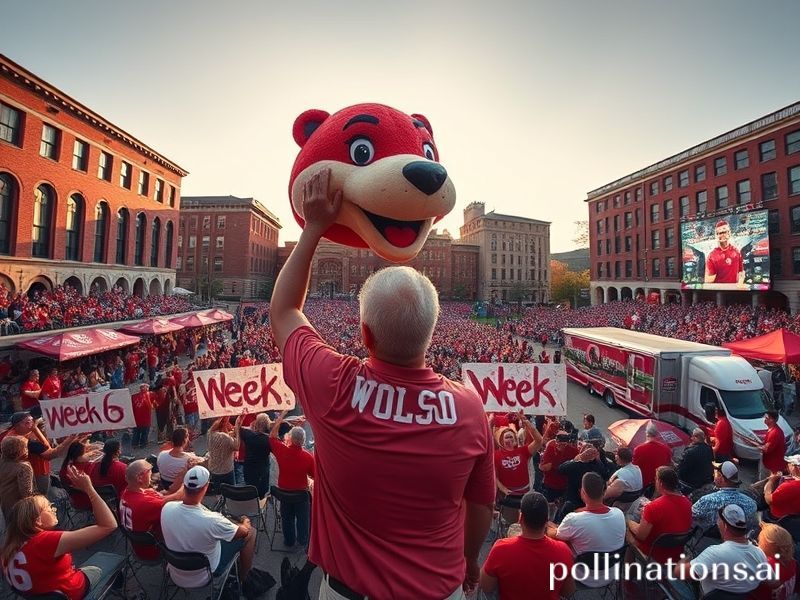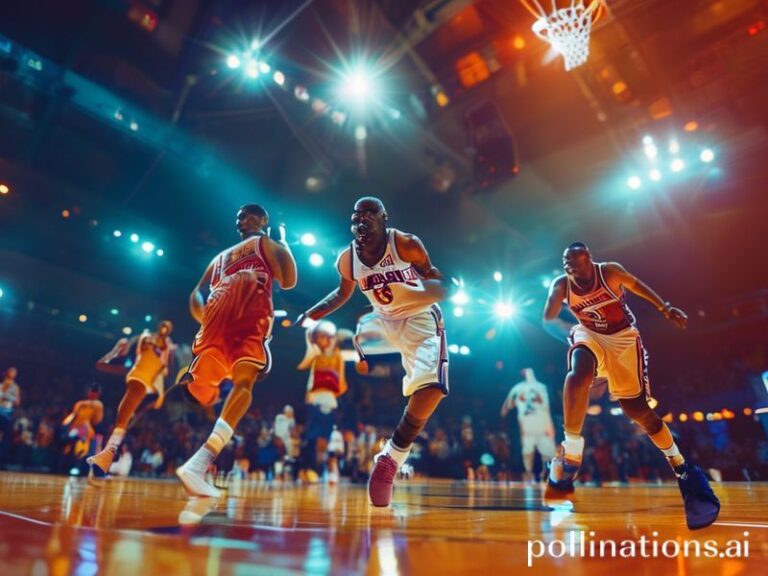Global Gladiators: How College GameDay Week 6 Quietly Runs the World
College GameDay Week 6: The World Watches America Argue Over a Leather Oblate Spheroid
By Matteo “Malbec” Moreau, Buenos Aires Bureau Chief
Somewhere in the ionized haze above the Atlantic, trans-Atlantic flights are detouring so passengers can catch the final three minutes of Tennessee vs. Texas A&M on seat-back screens. Down below, container ships stacked like Jenga blocks carry Iowa corn to Guangzhou feedlots, but the manifest also lists 3,000 crimson “Roll Tide” foam fingers—destined, presumably, for Chinese superfans who have never seen a possum but can diagram a zone read in four languages. Welcome to College GameDay Week 6, the planet’s most efficient soft-power export since Coca-Cola started tasting like battery acid and nostalgia.
Americans still think the show is about football. The rest of us know it’s a weekly telethon for geopolitical anxiety. When Kirk Herbstreit declares a freshman quarterback “has the world on his shoulders,” he’s not wrong; half the world’s rare-earth metals are literally in that kid’s iPhone. Meanwhile, Desmond Howard waves a foam sword at the camera, blissfully unaware it was injection-molded in the same Shenzhen plant that also produces tear-gas canisters for export. One shift makes Saturday fun, the next makes Sunday protests more photogenic. Synergy, baby.
Over in Europe, pubs that once opened at dawn for Champions League now serve biscuits and gravy to expats screaming “War Eagle” at a 17-year-old kicker from Melbourne, Australia—who missed a 49-yarder but still has better job security than any Greek civil servant. The bartender, a Catalan separatist, scribbles “Geaux Tigers” on a chalkboard because he’s learned that Louisiana francophilia is easier to monetize than actual French labor reforms. Everyone wins, especially Visa.
Africa, as ever, is told to stay in its lane. The same satellite feed that beams GameDay into Lagos cybercafés skips the commercials—something about NCAA broadcast rights being “territorial.” So Nigerian viewers fill the gaps with jollof-rice ads pirated from Nollywood, creating the only known media environment where Nick Saban and Ramsey Nouah share screen time. Odds are decent the next SEC dynasty will be coached by a kid who learned Cover-3 from buffering YouTube clips under a generator-powered ceiling fan.
The Middle East, never one to miss a branding opportunity, is already scouting Tuscaloosa for indoor stadium know-how. Qatar’s Aspire Academy has reportedly offered Oregon’s strength coach $4 million tax-free to teach “explosive movement”—a term that means something very different when your practice facility is 50 meters from an airbase. Sources say the deal stalled when the coach asked if recruits’ parents would be issued second passports and a Netflix subscription. Apparently, even petrostates have budget caps.
Latin America watches with the weary amusement of a cousin who’s seen every family intervention end in karaoke. We export lithium for those dazzling video boards, then import the delusion that a 2-loss Pac-12 team still controls its destiny. Our presidents tweet “¡Fuerza!” at alma maters they never attended, secure in the knowledge that impeachment scandals move slower than an SEC replay review. Down here, corruption at least has the decency to be transparent; up there, it’s wrapped in a Coors Light commercial narrated by a Pulitzer winner.
Of course, the real action is in the metaverse—where a digital Lee Corso dons an NFT mascot head that later gets rug-pulled by a 19-year-old in Estonia. Virtual tailgates now outnumber actual RVs in some lots, a triumph of blockchain over blocked arteries. Still, the smell of smoked brisket remains non-fungible; until Silicon Valley figures out how to tokenize mesquite, the physical realm retains one unfair advantage.
By midnight Greenwich Mean Time, College Station is ankle-deep in Lone Star and regret. The winning coach praises “these kids’ resilience,” which is adorable considering half the roster has already declared for the transfer portal by the time the podium lights dim. Somewhere on the Pacific Ring of Fire, a volcano erupts, spewing ash that will eventually settle on the AstroTurf of a Boise State practice field. The cycle renews: tectonic plates grind, TV contracts renew, and the planet keeps spinning—though slightly faster during commercial breaks.
Conclusion: From Lagos to Ljubljana, Week 6 reminds us that American college football isn’t just a sport; it’s the last shared mythology a fractured globe can binge without subtitles. We mock the pageantry, then secretly schedule our coups and climate summits around kickoff times. Because if the Anthropocene has a soundtrack, it’s a marching band playing “Sweet Caroline” while sea levels rise just enough to flood the visitor’s locker room. Roll Tide, world. See you next Saturday—assuming the grid holds.







